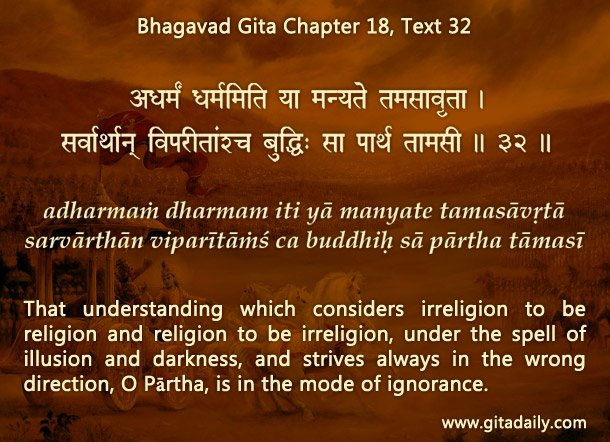The Bhagavad-gita (18.32) states that intelligence in the mode of ignorance arrives at conclusions which are the opposite of the right conclusions. Navigating Fruitless Struggles in Meditation.
Frequently, in our inner world, we find that such conceptions arise which obstruct us in our endeavors to connect with Krishna. One such notion is, “My mind is too distracted to ever be able to focus — it takes too much effort, and there’s too little result in terms of my mind actually focusing on Krishna. Therefore, meditation is not worth practicing for me.”
The rationale here is often phrased not as a wholesale rejection of meditation but as a sneaky relegation of meditation to a venerated yet castrated upstairs: “Meditation is good, but it is not for me—at least not now. Maybe a few years or decades down the line I may try it out; it’s definitely good.” This is nominal appreciation followed by categorical relegation to non-practice. Thus, we reduce meditation to irrelevance for us or even impotence when it comes to us. Most of us may not go to this extreme in terms of giving up our meditational practices, yet many of us may nonetheless give up the effort to focus during our meditation because such focus seems too difficult and decide that such focus may happen whenever it happens in some distant future.
Instead of arriving at the discouraging conclusion that meditation is pointless because we are not able to focus, we could take the same data points and arrive at an opposite, more encouraging conclusion — provided our intelligence is better informed and better guided by good association in sattva guna instead of being misguided by tamo guna. What is that healthier conclusion? It could run something like this, “Even though I am not able to focus so well in meditation, I have nonetheless experienced some benefits from it despite my distracted and half-hearted practice: I still have experienced moments of peace, clarity, empowerment, purification, and some divine presence or some connection with Krishna.” True, such moments may be infrequent and transient, yet we all have experienced such moments on our spiritual journey in general and even during our meditation practice in particular. Unfortunately and unsurprisingly, given the deceptions that prevail in our inner world, we tend to forget such moments of sublime experience during our meditation, and we only remember those times when our meditation seems to be a fruitless effort in fighting for focusing — and failing again and again.
Thankfully, a better way exists for us. If we regularly study the Gita and let ourselves be guided by the healthier conviction and conclusion that even though our meditational practices are not yet sufficiently or satisfactorily spiritualizing our consciousness, we are still gaining some moments of spiritual experience, then the memory of those moments can give us the momentum to push on when we experience the dry or barren phases during meditation.
By such curated remembrance and such cultivated resolve, we all can gradually come to a state of steady focus, till the spiritual experience becomes more and more frequent, more and more enriching, and more and more transformative, until Krishna becomes a living and loving reality for us, who is always with us and with whom we always choose to be.
Summary:
- When we are misguided by intelligence in the mode of ignorance, we arrive at the wrong conclusion that because we struggle so much in focusing on Krishna during our meditation, we should just give up meditation itself or give up any attempt to focus during meditation.
- A better-situated intelligence in sattva will infer from the same situation a healthier conclusion; despite our distracted, half-hearted practice of meditation, we have still had some moments of spiritual experiences.
- If we strive more to focus better on Krishna, how much richer, sweeter, and deeper will our spiritual experiences be — by such thinking, we can get the momentum to persist in our meditation.
Think it over:
- Recollect one incident when your intelligence, being misguided by ignorance, led you to a conclusion that discouraged you in your spiritual practices.
- Starting with the same experience, how can you use your intelligence now to arrive at a healthier conclusion that preserves your enthusiasm in our spiritual practices?
- When we try to meditate, what kind of memories tend to come to us? What kind of memories do we need to highlight instead?
***
18.32: That understanding which considers irreligion to be religion and religion to be irreligion, under the spell of illusion and darkness, and strives always in the wrong direction, O Partha, is in the mode of ignorance.



Leave A Comment